Assessing Brexit Impact on UK Finance & Global Trade Challenges
VerifiedAdded on 2024/06/05
|18
|4214
|379
Report
AI Summary
This report provides a comprehensive analysis of the critical issues in business management, focusing on the impact of Brexit on the UK's finance sector and global trade trends within Commonwealth countries. It explores key trends in trade of goods and services, assesses the impact of Brexit on trade and investment in the UK's finance sector, and critically evaluates the challenges and opportunities for multinational enterprises (MNEs) in the finance sector post-Brexit. The report considers the volatility, uncertainty, complexity, and ambiguity (VUCA) of the current economic conditions, the influence of globalization, and the impact of technological innovations. It also addresses the shift in economic power, demographic changes, and climate change, offering recommendations for navigating the evolving global trade landscape. Desklib provides access to this report along with a variety of past papers and solved assignments to support students in their studies.
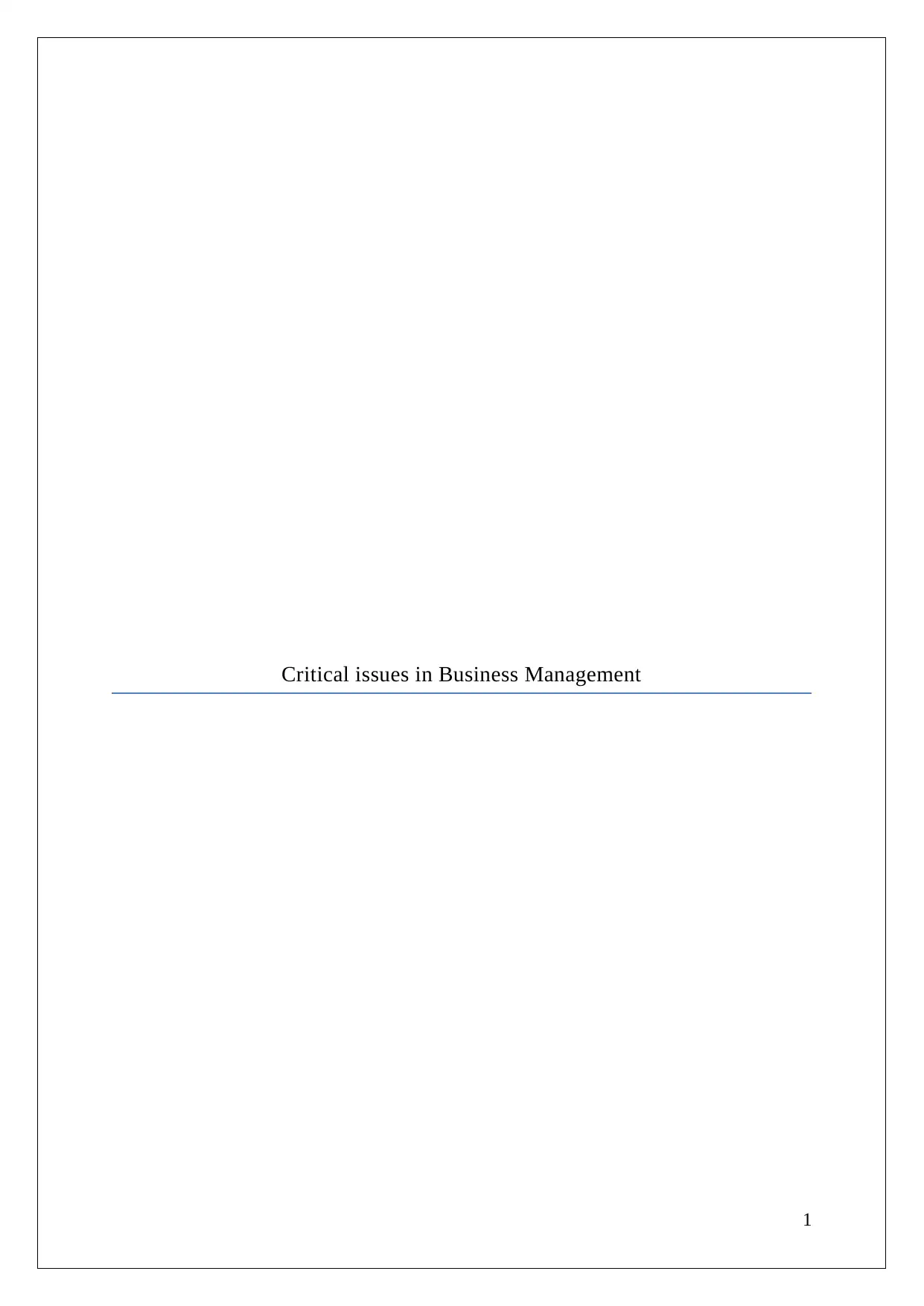
Critical issues in Business Management
1
1
Paraphrase This Document
Need a fresh take? Get an instant paraphrase of this document with our AI Paraphraser
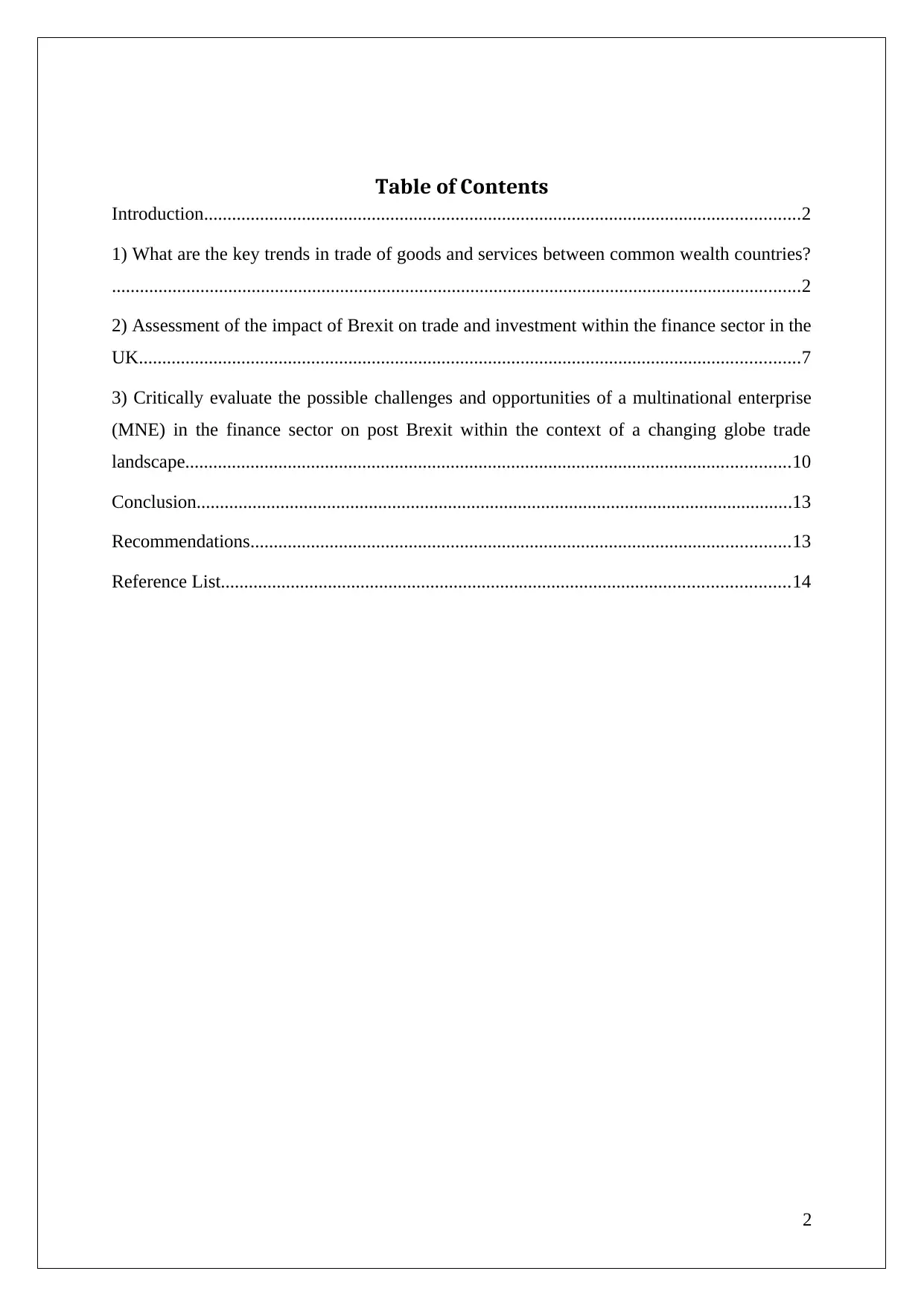
Table of Contents
Introduction................................................................................................................................2
1) What are the key trends in trade of goods and services between common wealth countries?
....................................................................................................................................................2
2) Assessment of the impact of Brexit on trade and investment within the finance sector in the
UK..............................................................................................................................................7
3) Critically evaluate the possible challenges and opportunities of a multinational enterprise
(MNE) in the finance sector on post Brexit within the context of a changing globe trade
landscape..................................................................................................................................10
Conclusion................................................................................................................................13
Recommendations....................................................................................................................13
Reference List..........................................................................................................................14
2
Introduction................................................................................................................................2
1) What are the key trends in trade of goods and services between common wealth countries?
....................................................................................................................................................2
2) Assessment of the impact of Brexit on trade and investment within the finance sector in the
UK..............................................................................................................................................7
3) Critically evaluate the possible challenges and opportunities of a multinational enterprise
(MNE) in the finance sector on post Brexit within the context of a changing globe trade
landscape..................................................................................................................................10
Conclusion................................................................................................................................13
Recommendations....................................................................................................................13
Reference List..........................................................................................................................14
2
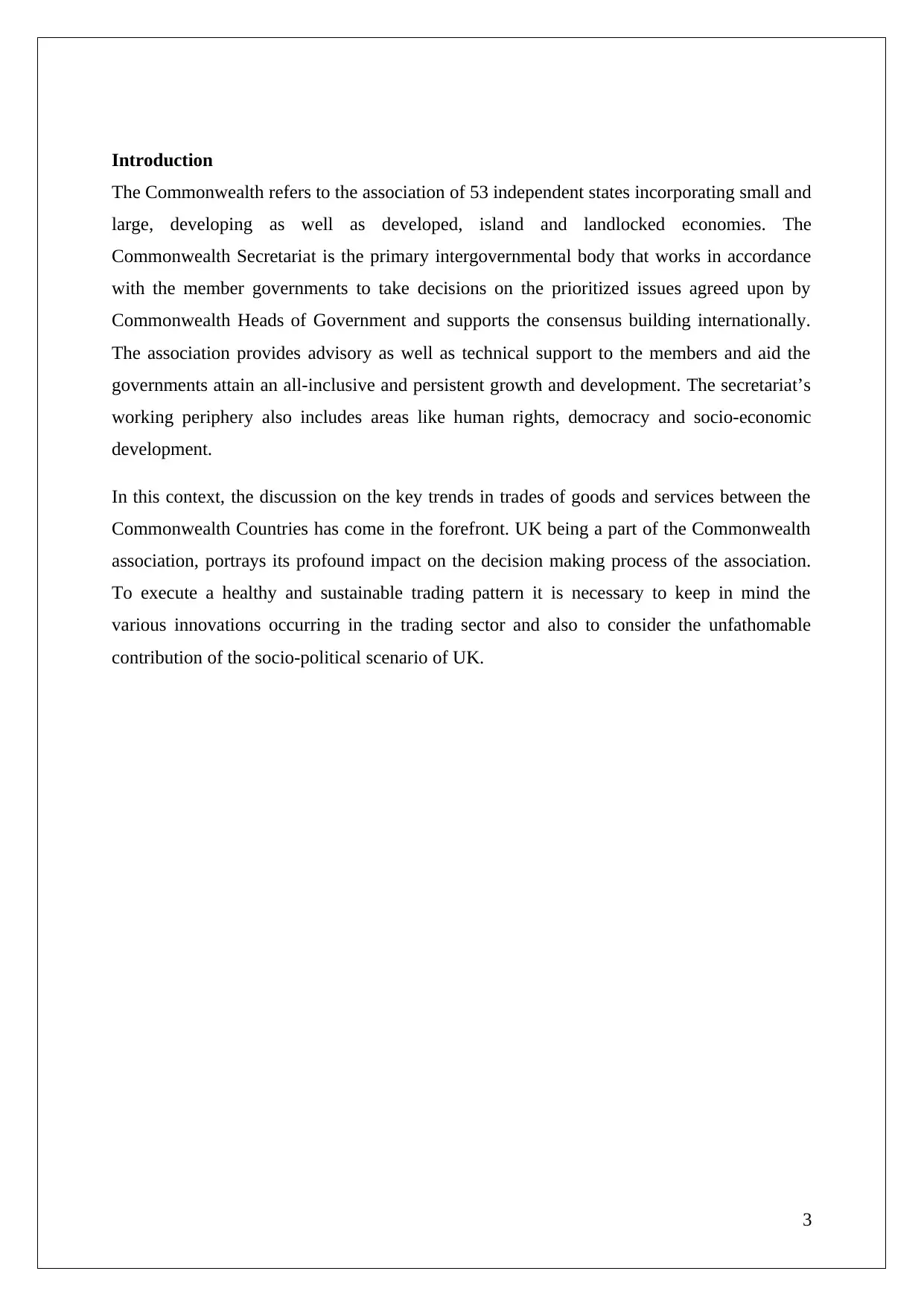
Introduction
The Commonwealth refers to the association of 53 independent states incorporating small and
large, developing as well as developed, island and landlocked economies. The
Commonwealth Secretariat is the primary intergovernmental body that works in accordance
with the member governments to take decisions on the prioritized issues agreed upon by
Commonwealth Heads of Government and supports the consensus building internationally.
The association provides advisory as well as technical support to the members and aid the
governments attain an all-inclusive and persistent growth and development. The secretariat’s
working periphery also includes areas like human rights, democracy and socio-economic
development.
In this context, the discussion on the key trends in trades of goods and services between the
Commonwealth Countries has come in the forefront. UK being a part of the Commonwealth
association, portrays its profound impact on the decision making process of the association.
To execute a healthy and sustainable trading pattern it is necessary to keep in mind the
various innovations occurring in the trading sector and also to consider the unfathomable
contribution of the socio-political scenario of UK.
3
The Commonwealth refers to the association of 53 independent states incorporating small and
large, developing as well as developed, island and landlocked economies. The
Commonwealth Secretariat is the primary intergovernmental body that works in accordance
with the member governments to take decisions on the prioritized issues agreed upon by
Commonwealth Heads of Government and supports the consensus building internationally.
The association provides advisory as well as technical support to the members and aid the
governments attain an all-inclusive and persistent growth and development. The secretariat’s
working periphery also includes areas like human rights, democracy and socio-economic
development.
In this context, the discussion on the key trends in trades of goods and services between the
Commonwealth Countries has come in the forefront. UK being a part of the Commonwealth
association, portrays its profound impact on the decision making process of the association.
To execute a healthy and sustainable trading pattern it is necessary to keep in mind the
various innovations occurring in the trading sector and also to consider the unfathomable
contribution of the socio-political scenario of UK.
3
⊘ This is a preview!⊘
Do you want full access?
Subscribe today to unlock all pages.

Trusted by 1+ million students worldwide
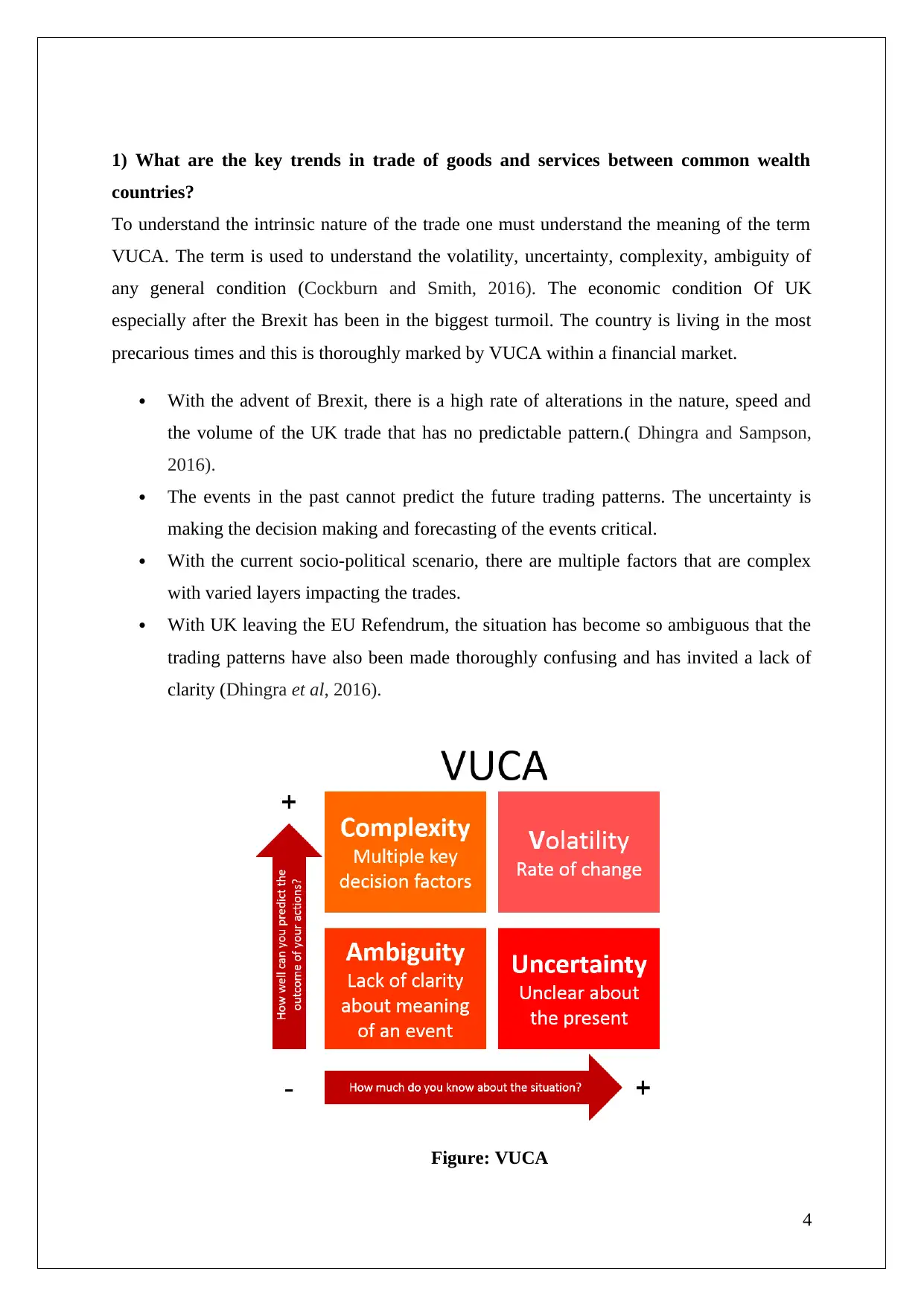
1) What are the key trends in trade of goods and services between common wealth
countries?
To understand the intrinsic nature of the trade one must understand the meaning of the term
VUCA. The term is used to understand the volatility, uncertainty, complexity, ambiguity of
any general condition (Cockburn and Smith, 2016). The economic condition Of UK
especially after the Brexit has been in the biggest turmoil. The country is living in the most
precarious times and this is thoroughly marked by VUCA within a financial market.
With the advent of Brexit, there is a high rate of alterations in the nature, speed and
the volume of the UK trade that has no predictable pattern.( Dhingra and Sampson,
2016).
The events in the past cannot predict the future trading patterns. The uncertainty is
making the decision making and forecasting of the events critical.
With the current socio-political scenario, there are multiple factors that are complex
with varied layers impacting the trades.
With UK leaving the EU Refendrum, the situation has become so ambiguous that the
trading patterns have also been made thoroughly confusing and has invited a lack of
clarity (Dhingra et al, 2016).
Figure: VUCA
4
countries?
To understand the intrinsic nature of the trade one must understand the meaning of the term
VUCA. The term is used to understand the volatility, uncertainty, complexity, ambiguity of
any general condition (Cockburn and Smith, 2016). The economic condition Of UK
especially after the Brexit has been in the biggest turmoil. The country is living in the most
precarious times and this is thoroughly marked by VUCA within a financial market.
With the advent of Brexit, there is a high rate of alterations in the nature, speed and
the volume of the UK trade that has no predictable pattern.( Dhingra and Sampson,
2016).
The events in the past cannot predict the future trading patterns. The uncertainty is
making the decision making and forecasting of the events critical.
With the current socio-political scenario, there are multiple factors that are complex
with varied layers impacting the trades.
With UK leaving the EU Refendrum, the situation has become so ambiguous that the
trading patterns have also been made thoroughly confusing and has invited a lack of
clarity (Dhingra et al, 2016).
Figure: VUCA
4
Paraphrase This Document
Need a fresh take? Get an instant paraphrase of this document with our AI Paraphraser
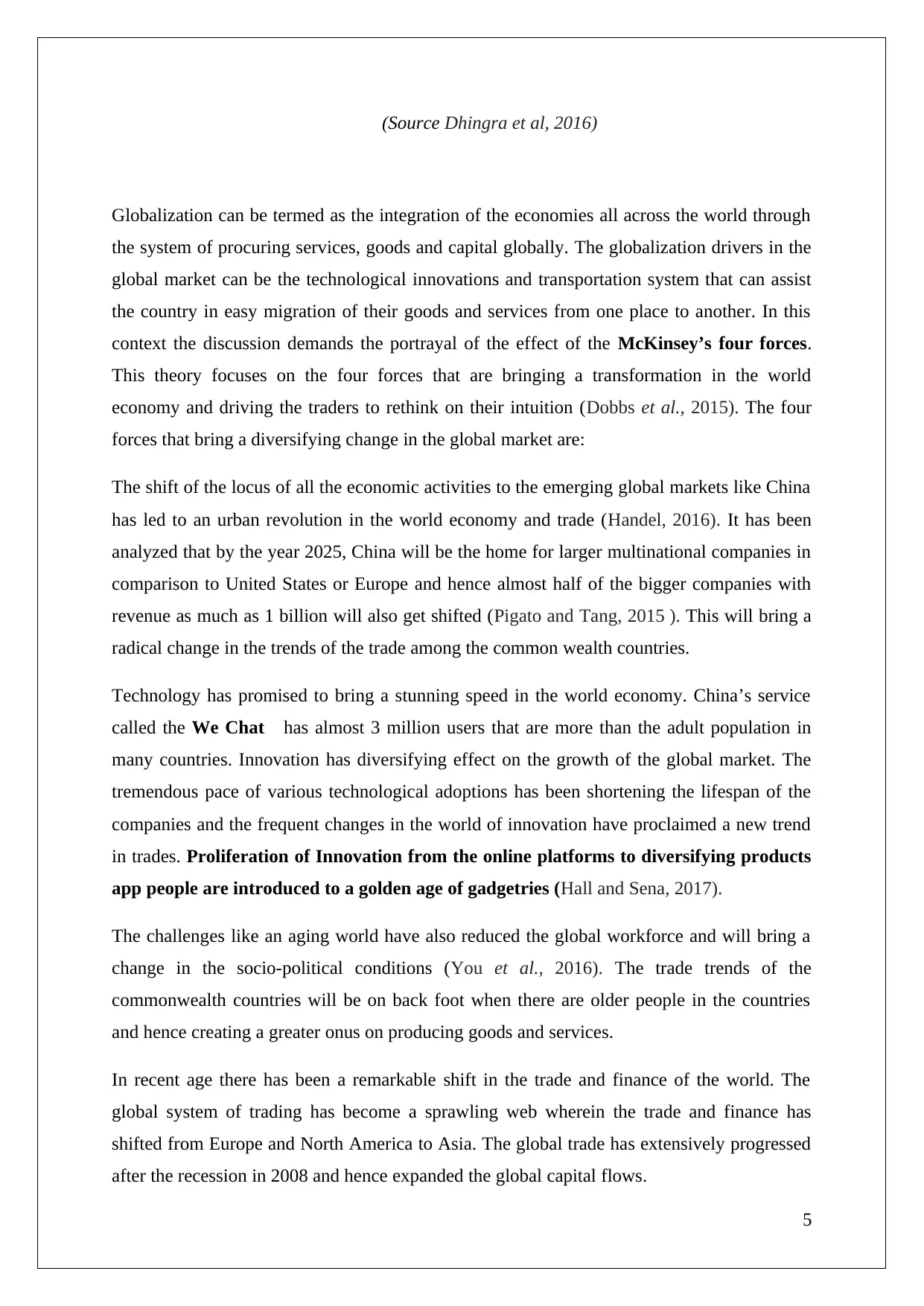
(Source Dhingra et al, 2016)
Globalization can be termed as the integration of the economies all across the world through
the system of procuring services, goods and capital globally. The globalization drivers in the
global market can be the technological innovations and transportation system that can assist
the country in easy migration of their goods and services from one place to another. In this
context the discussion demands the portrayal of the effect of the McKinsey’s four forces.
This theory focuses on the four forces that are bringing a transformation in the world
economy and driving the traders to rethink on their intuition (Dobbs et al., 2015). The four
forces that bring a diversifying change in the global market are:
The shift of the locus of all the economic activities to the emerging global markets like China
has led to an urban revolution in the world economy and trade (Handel, 2016). It has been
analyzed that by the year 2025, China will be the home for larger multinational companies in
comparison to United States or Europe and hence almost half of the bigger companies with
revenue as much as 1 billion will also get shifted (Pigato and Tang, 2015 ). This will bring a
radical change in the trends of the trade among the common wealth countries.
Technology has promised to bring a stunning speed in the world economy. China’s service
called the We Chat has almost 3 million users that are more than the adult population in
many countries. Innovation has diversifying effect on the growth of the global market. The
tremendous pace of various technological adoptions has been shortening the lifespan of the
companies and the frequent changes in the world of innovation have proclaimed a new trend
in trades. Proliferation of Innovation from the online platforms to diversifying products
app people are introduced to a golden age of gadgetries (Hall and Sena, 2017).
The challenges like an aging world have also reduced the global workforce and will bring a
change in the socio-political conditions (You et al., 2016). The trade trends of the
commonwealth countries will be on back foot when there are older people in the countries
and hence creating a greater onus on producing goods and services.
In recent age there has been a remarkable shift in the trade and finance of the world. The
global system of trading has become a sprawling web wherein the trade and finance has
shifted from Europe and North America to Asia. The global trade has extensively progressed
after the recession in 2008 and hence expanded the global capital flows.
5
Globalization can be termed as the integration of the economies all across the world through
the system of procuring services, goods and capital globally. The globalization drivers in the
global market can be the technological innovations and transportation system that can assist
the country in easy migration of their goods and services from one place to another. In this
context the discussion demands the portrayal of the effect of the McKinsey’s four forces.
This theory focuses on the four forces that are bringing a transformation in the world
economy and driving the traders to rethink on their intuition (Dobbs et al., 2015). The four
forces that bring a diversifying change in the global market are:
The shift of the locus of all the economic activities to the emerging global markets like China
has led to an urban revolution in the world economy and trade (Handel, 2016). It has been
analyzed that by the year 2025, China will be the home for larger multinational companies in
comparison to United States or Europe and hence almost half of the bigger companies with
revenue as much as 1 billion will also get shifted (Pigato and Tang, 2015 ). This will bring a
radical change in the trends of the trade among the common wealth countries.
Technology has promised to bring a stunning speed in the world economy. China’s service
called the We Chat has almost 3 million users that are more than the adult population in
many countries. Innovation has diversifying effect on the growth of the global market. The
tremendous pace of various technological adoptions has been shortening the lifespan of the
companies and the frequent changes in the world of innovation have proclaimed a new trend
in trades. Proliferation of Innovation from the online platforms to diversifying products
app people are introduced to a golden age of gadgetries (Hall and Sena, 2017).
The challenges like an aging world have also reduced the global workforce and will bring a
change in the socio-political conditions (You et al., 2016). The trade trends of the
commonwealth countries will be on back foot when there are older people in the countries
and hence creating a greater onus on producing goods and services.
In recent age there has been a remarkable shift in the trade and finance of the world. The
global system of trading has become a sprawling web wherein the trade and finance has
shifted from Europe and North America to Asia. The global trade has extensively progressed
after the recession in 2008 and hence expanded the global capital flows.
5
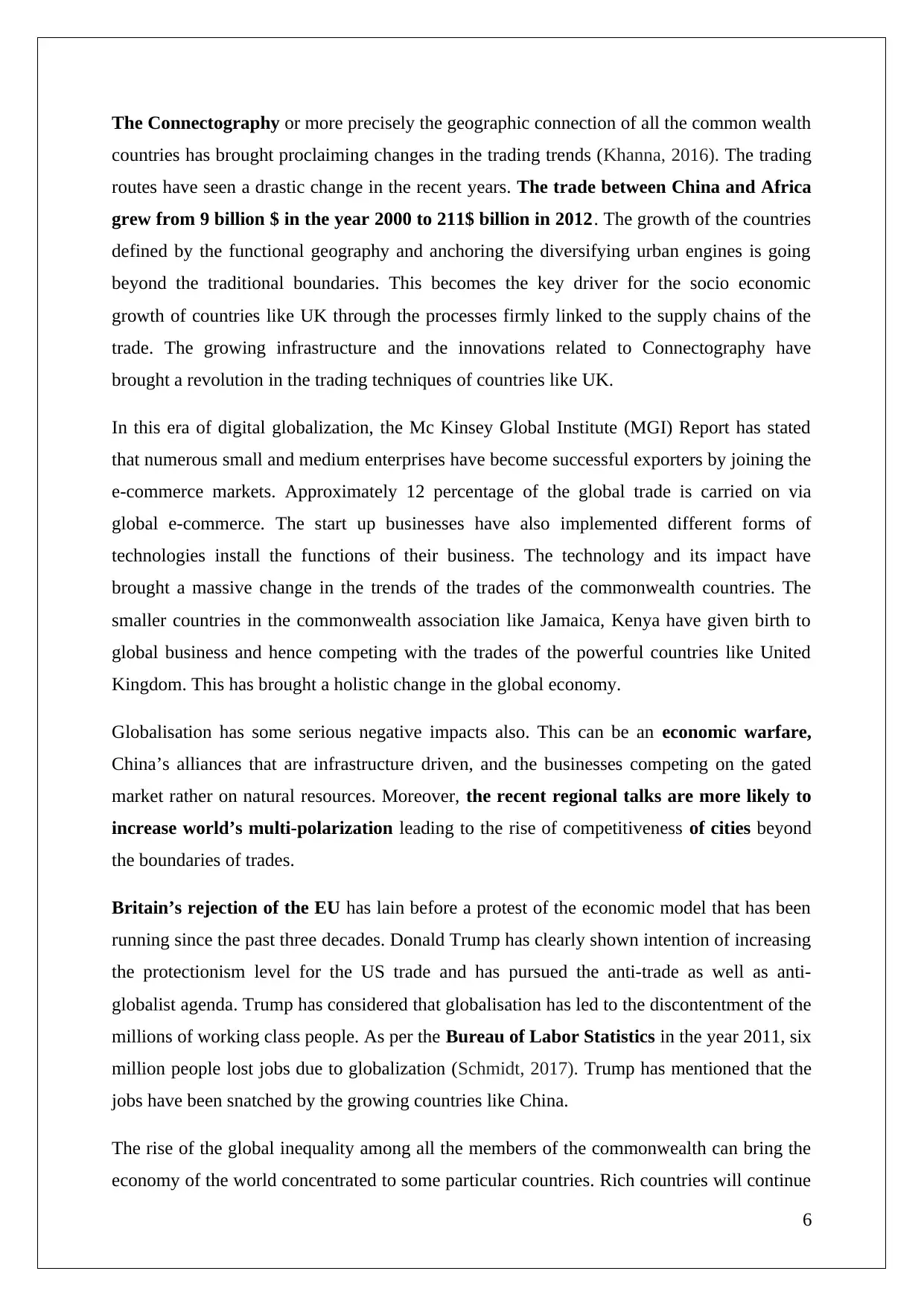
The Connectography or more precisely the geographic connection of all the common wealth
countries has brought proclaiming changes in the trading trends (Khanna, 2016). The trading
routes have seen a drastic change in the recent years. The trade between China and Africa
grew from 9 billion $ in the year 2000 to 211$ billion in 2012. The growth of the countries
defined by the functional geography and anchoring the diversifying urban engines is going
beyond the traditional boundaries. This becomes the key driver for the socio economic
growth of countries like UK through the processes firmly linked to the supply chains of the
trade. The growing infrastructure and the innovations related to Connectography have
brought a revolution in the trading techniques of countries like UK.
In this era of digital globalization, the Mc Kinsey Global Institute (MGI) Report has stated
that numerous small and medium enterprises have become successful exporters by joining the
e-commerce markets. Approximately 12 percentage of the global trade is carried on via
global e-commerce. The start up businesses have also implemented different forms of
technologies install the functions of their business. The technology and its impact have
brought a massive change in the trends of the trades of the commonwealth countries. The
smaller countries in the commonwealth association like Jamaica, Kenya have given birth to
global business and hence competing with the trades of the powerful countries like United
Kingdom. This has brought a holistic change in the global economy.
Globalisation has some serious negative impacts also. This can be an economic warfare,
China’s alliances that are infrastructure driven, and the businesses competing on the gated
market rather on natural resources. Moreover, the recent regional talks are more likely to
increase world’s multi-polarization leading to the rise of competitiveness of cities beyond
the boundaries of trades.
Britain’s rejection of the EU has lain before a protest of the economic model that has been
running since the past three decades. Donald Trump has clearly shown intention of increasing
the protectionism level for the US trade and has pursued the anti-trade as well as anti-
globalist agenda. Trump has considered that globalisation has led to the discontentment of the
millions of working class people. As per the Bureau of Labor Statistics in the year 2011, six
million people lost jobs due to globalization (Schmidt, 2017). Trump has mentioned that the
jobs have been snatched by the growing countries like China.
The rise of the global inequality among all the members of the commonwealth can bring the
economy of the world concentrated to some particular countries. Rich countries will continue
6
countries has brought proclaiming changes in the trading trends (Khanna, 2016). The trading
routes have seen a drastic change in the recent years. The trade between China and Africa
grew from 9 billion $ in the year 2000 to 211$ billion in 2012. The growth of the countries
defined by the functional geography and anchoring the diversifying urban engines is going
beyond the traditional boundaries. This becomes the key driver for the socio economic
growth of countries like UK through the processes firmly linked to the supply chains of the
trade. The growing infrastructure and the innovations related to Connectography have
brought a revolution in the trading techniques of countries like UK.
In this era of digital globalization, the Mc Kinsey Global Institute (MGI) Report has stated
that numerous small and medium enterprises have become successful exporters by joining the
e-commerce markets. Approximately 12 percentage of the global trade is carried on via
global e-commerce. The start up businesses have also implemented different forms of
technologies install the functions of their business. The technology and its impact have
brought a massive change in the trends of the trades of the commonwealth countries. The
smaller countries in the commonwealth association like Jamaica, Kenya have given birth to
global business and hence competing with the trades of the powerful countries like United
Kingdom. This has brought a holistic change in the global economy.
Globalisation has some serious negative impacts also. This can be an economic warfare,
China’s alliances that are infrastructure driven, and the businesses competing on the gated
market rather on natural resources. Moreover, the recent regional talks are more likely to
increase world’s multi-polarization leading to the rise of competitiveness of cities beyond
the boundaries of trades.
Britain’s rejection of the EU has lain before a protest of the economic model that has been
running since the past three decades. Donald Trump has clearly shown intention of increasing
the protectionism level for the US trade and has pursued the anti-trade as well as anti-
globalist agenda. Trump has considered that globalisation has led to the discontentment of the
millions of working class people. As per the Bureau of Labor Statistics in the year 2011, six
million people lost jobs due to globalization (Schmidt, 2017). Trump has mentioned that the
jobs have been snatched by the growing countries like China.
The rise of the global inequality among all the members of the commonwealth can bring the
economy of the world concentrated to some particular countries. Rich countries will continue
6
⊘ This is a preview!⊘
Do you want full access?
Subscribe today to unlock all pages.

Trusted by 1+ million students worldwide
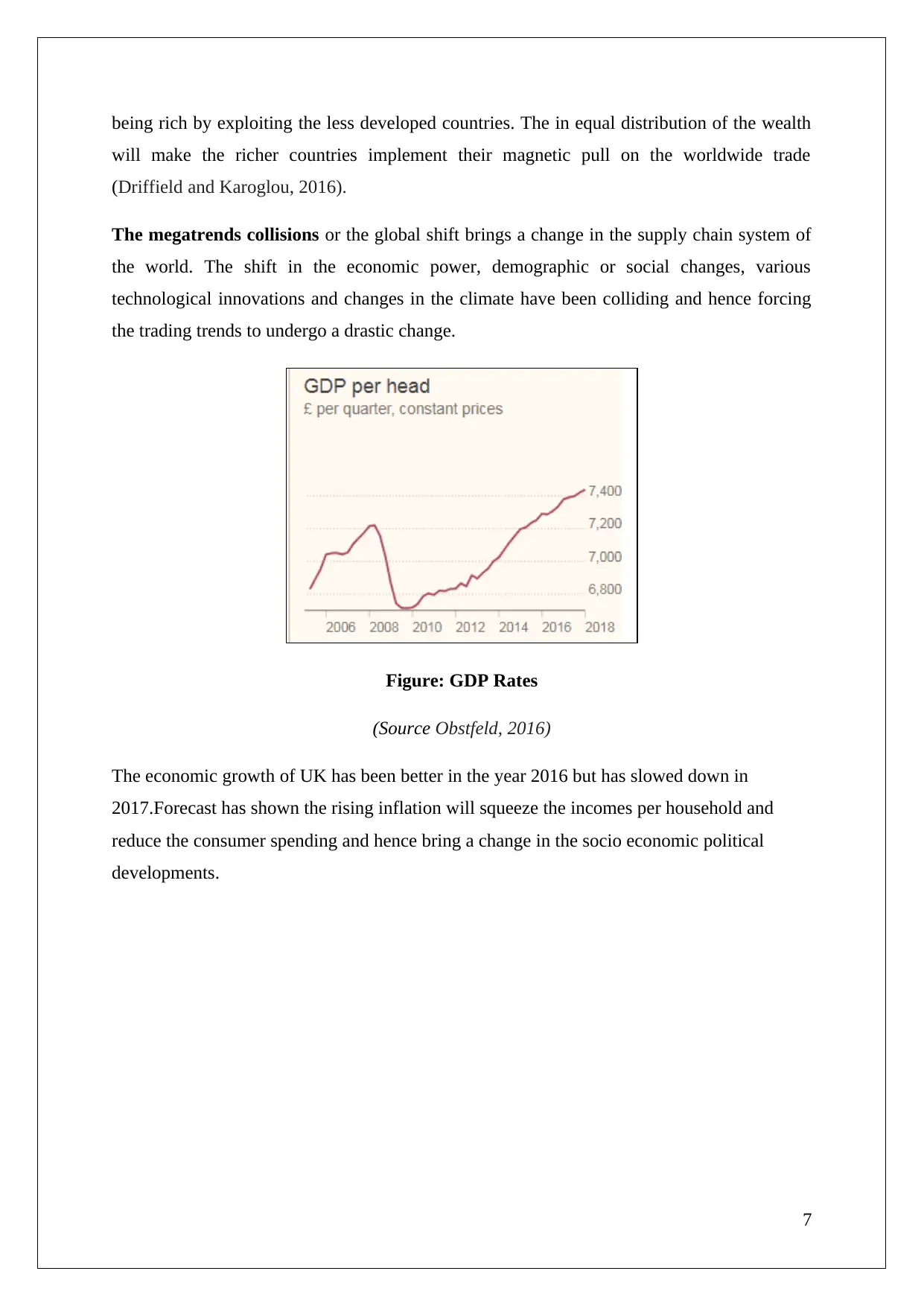
being rich by exploiting the less developed countries. The in equal distribution of the wealth
will make the richer countries implement their magnetic pull on the worldwide trade
(Driffield and Karoglou, 2016).
The megatrends collisions or the global shift brings a change in the supply chain system of
the world. The shift in the economic power, demographic or social changes, various
technological innovations and changes in the climate have been colliding and hence forcing
the trading trends to undergo a drastic change.
Figure: GDP Rates
(Source Obstfeld, 2016)
The economic growth of UK has been better in the year 2016 but has slowed down in
2017.Forecast has shown the rising inflation will squeeze the incomes per household and
reduce the consumer spending and hence bring a change in the socio economic political
developments.
7
will make the richer countries implement their magnetic pull on the worldwide trade
(Driffield and Karoglou, 2016).
The megatrends collisions or the global shift brings a change in the supply chain system of
the world. The shift in the economic power, demographic or social changes, various
technological innovations and changes in the climate have been colliding and hence forcing
the trading trends to undergo a drastic change.
Figure: GDP Rates
(Source Obstfeld, 2016)
The economic growth of UK has been better in the year 2016 but has slowed down in
2017.Forecast has shown the rising inflation will squeeze the incomes per household and
reduce the consumer spending and hence bring a change in the socio economic political
developments.
7
Paraphrase This Document
Need a fresh take? Get an instant paraphrase of this document with our AI Paraphraser
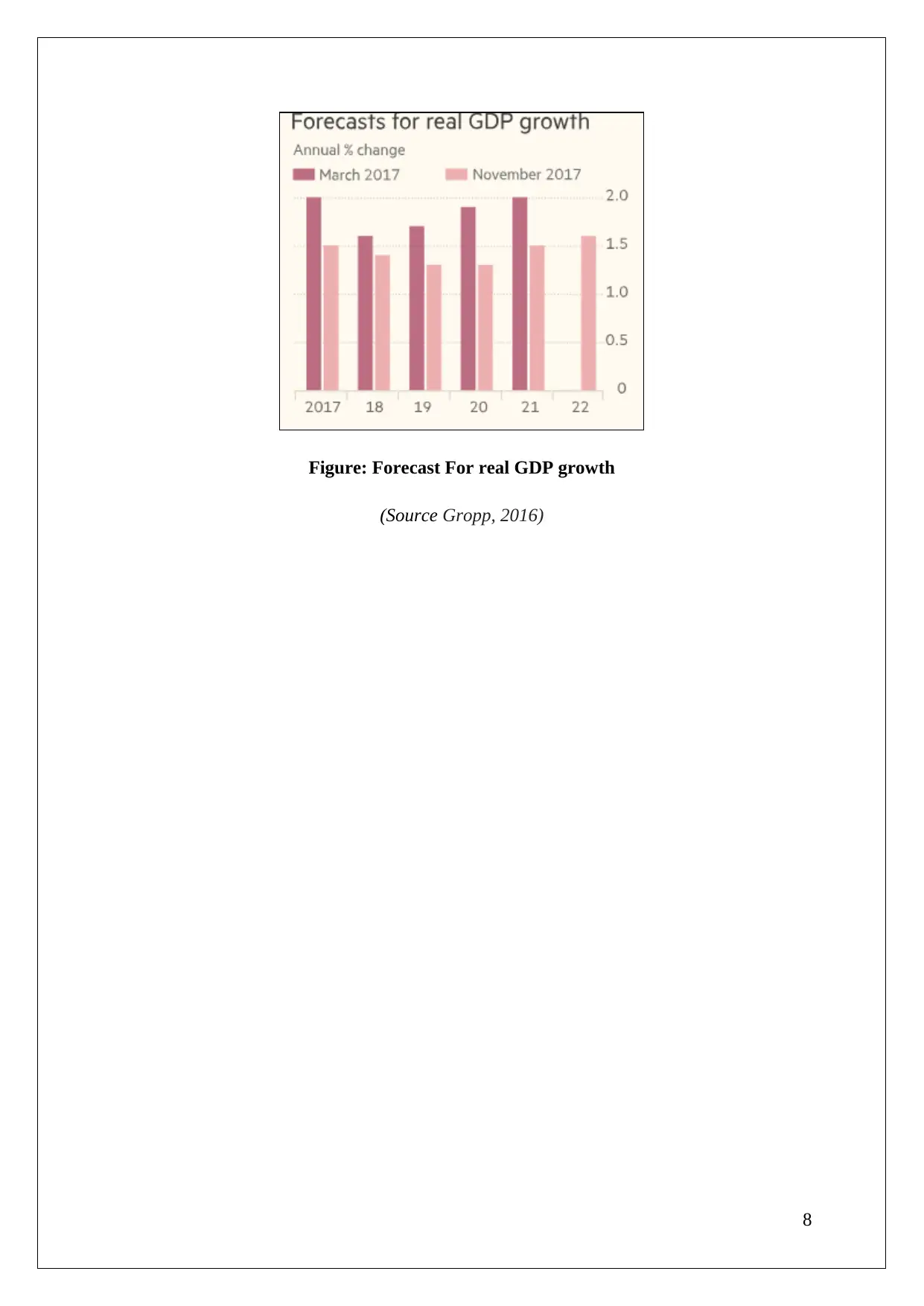
Figure: Forecast For real GDP growth
(Source Gropp, 2016)
8
(Source Gropp, 2016)
8
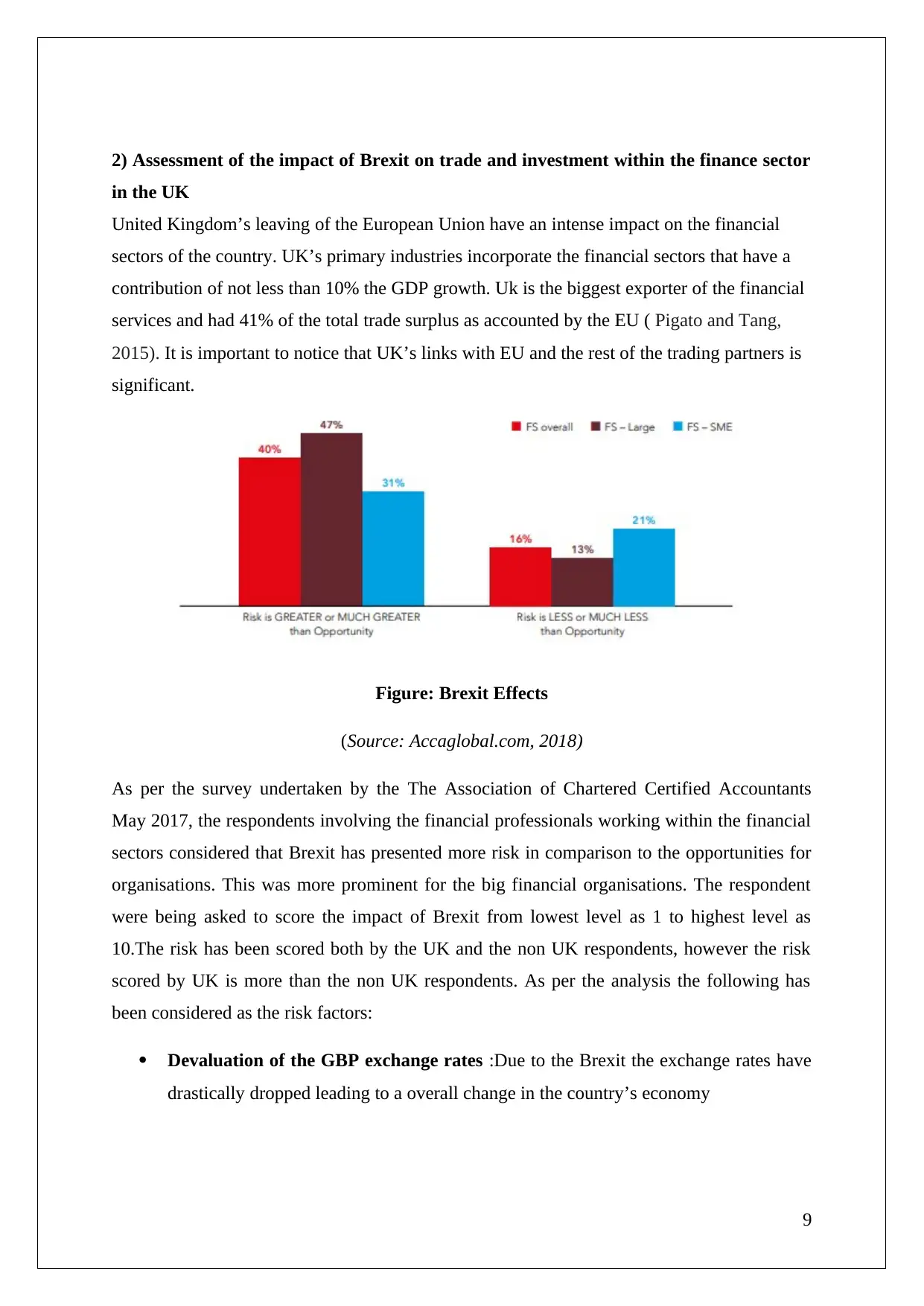
2) Assessment of the impact of Brexit on trade and investment within the finance sector
in the UK
United Kingdom’s leaving of the European Union have an intense impact on the financial
sectors of the country. UK’s primary industries incorporate the financial sectors that have a
contribution of not less than 10% the GDP growth. Uk is the biggest exporter of the financial
services and had 41% of the total trade surplus as accounted by the EU ( Pigato and Tang,
2015). It is important to notice that UK’s links with EU and the rest of the trading partners is
significant.
Figure: Brexit Effects
(Source: Accaglobal.com, 2018)
As per the survey undertaken by the The Association of Chartered Certified Accountants
May 2017, the respondents involving the financial professionals working within the financial
sectors considered that Brexit has presented more risk in comparison to the opportunities for
organisations. This was more prominent for the big financial organisations. The respondent
were being asked to score the impact of Brexit from lowest level as 1 to highest level as
10.The risk has been scored both by the UK and the non UK respondents, however the risk
scored by UK is more than the non UK respondents. As per the analysis the following has
been considered as the risk factors:
Devaluation of the GBP exchange rates :Due to the Brexit the exchange rates have
drastically dropped leading to a overall change in the country’s economy
9
in the UK
United Kingdom’s leaving of the European Union have an intense impact on the financial
sectors of the country. UK’s primary industries incorporate the financial sectors that have a
contribution of not less than 10% the GDP growth. Uk is the biggest exporter of the financial
services and had 41% of the total trade surplus as accounted by the EU ( Pigato and Tang,
2015). It is important to notice that UK’s links with EU and the rest of the trading partners is
significant.
Figure: Brexit Effects
(Source: Accaglobal.com, 2018)
As per the survey undertaken by the The Association of Chartered Certified Accountants
May 2017, the respondents involving the financial professionals working within the financial
sectors considered that Brexit has presented more risk in comparison to the opportunities for
organisations. This was more prominent for the big financial organisations. The respondent
were being asked to score the impact of Brexit from lowest level as 1 to highest level as
10.The risk has been scored both by the UK and the non UK respondents, however the risk
scored by UK is more than the non UK respondents. As per the analysis the following has
been considered as the risk factors:
Devaluation of the GBP exchange rates :Due to the Brexit the exchange rates have
drastically dropped leading to a overall change in the country’s economy
9
⊘ This is a preview!⊘
Do you want full access?
Subscribe today to unlock all pages.

Trusted by 1+ million students worldwide
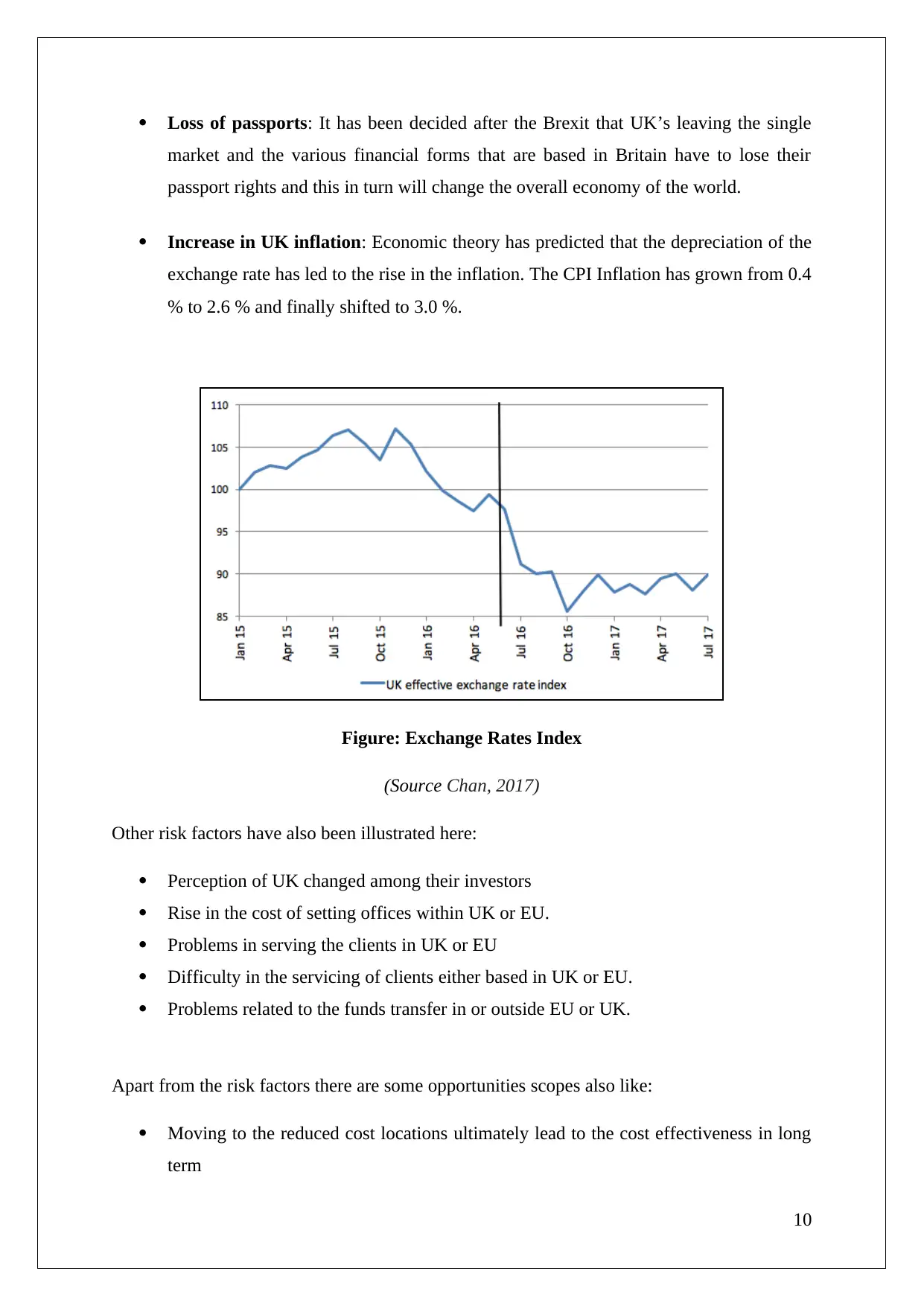
Loss of passports: It has been decided after the Brexit that UK’s leaving the single
market and the various financial forms that are based in Britain have to lose their
passport rights and this in turn will change the overall economy of the world.
Increase in UK inflation: Economic theory has predicted that the depreciation of the
exchange rate has led to the rise in the inflation. The CPI Inflation has grown from 0.4
% to 2.6 % and finally shifted to 3.0 %.
Figure: Exchange Rates Index
(Source Chan, 2017)
Other risk factors have also been illustrated here:
Perception of UK changed among their investors
Rise in the cost of setting offices within UK or EU.
Problems in serving the clients in UK or EU
Difficulty in the servicing of clients either based in UK or EU.
Problems related to the funds transfer in or outside EU or UK.
Apart from the risk factors there are some opportunities scopes also like:
Moving to the reduced cost locations ultimately lead to the cost effectiveness in long
term
10
market and the various financial forms that are based in Britain have to lose their
passport rights and this in turn will change the overall economy of the world.
Increase in UK inflation: Economic theory has predicted that the depreciation of the
exchange rate has led to the rise in the inflation. The CPI Inflation has grown from 0.4
% to 2.6 % and finally shifted to 3.0 %.
Figure: Exchange Rates Index
(Source Chan, 2017)
Other risk factors have also been illustrated here:
Perception of UK changed among their investors
Rise in the cost of setting offices within UK or EU.
Problems in serving the clients in UK or EU
Difficulty in the servicing of clients either based in UK or EU.
Problems related to the funds transfer in or outside EU or UK.
Apart from the risk factors there are some opportunities scopes also like:
Moving to the reduced cost locations ultimately lead to the cost effectiveness in long
term
10
Paraphrase This Document
Need a fresh take? Get an instant paraphrase of this document with our AI Paraphraser
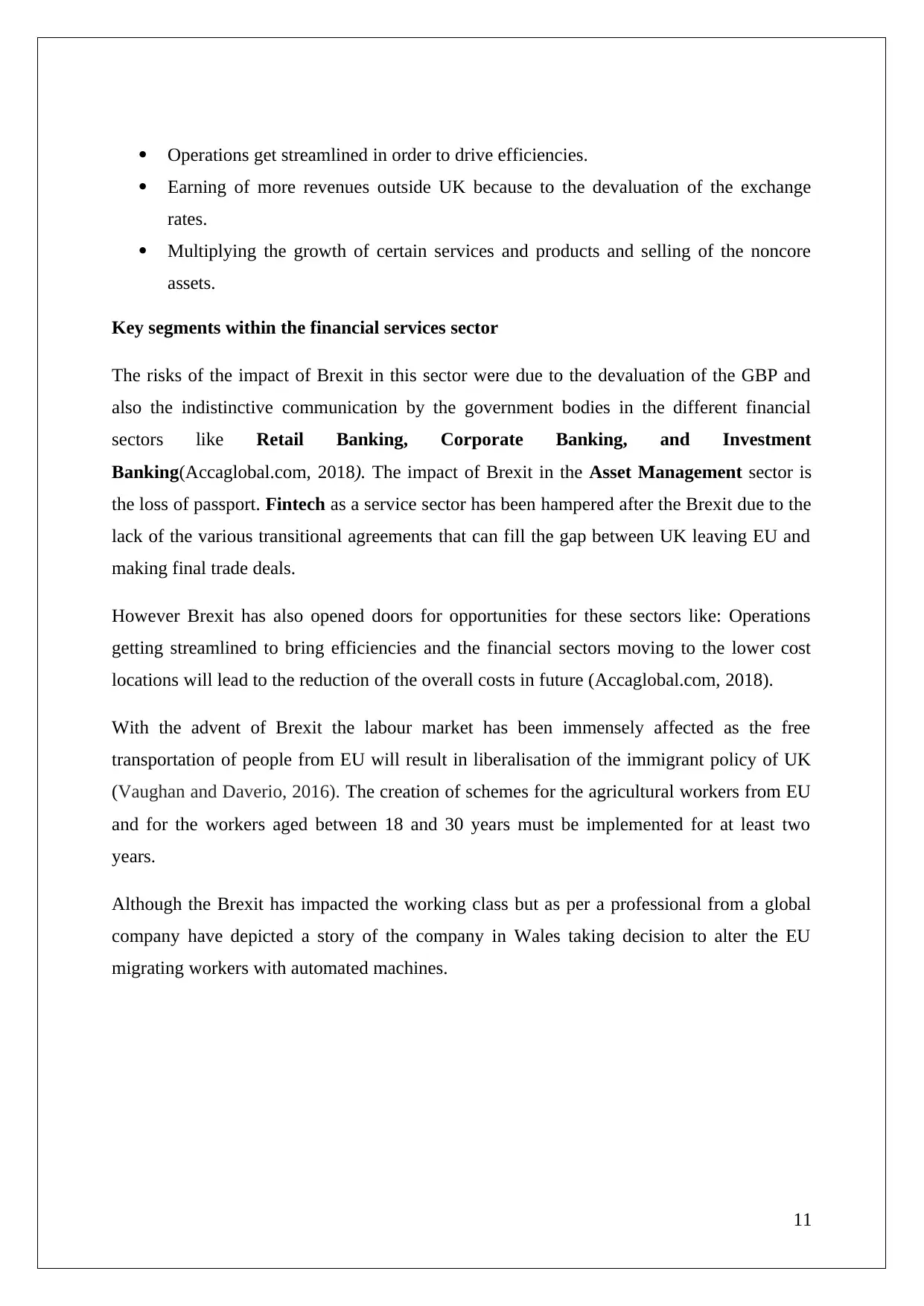
Operations get streamlined in order to drive efficiencies.
Earning of more revenues outside UK because to the devaluation of the exchange
rates.
Multiplying the growth of certain services and products and selling of the noncore
assets.
Key segments within the financial services sector
The risks of the impact of Brexit in this sector were due to the devaluation of the GBP and
also the indistinctive communication by the government bodies in the different financial
sectors like Retail Banking, Corporate Banking, and Investment
Banking(Accaglobal.com, 2018). The impact of Brexit in the Asset Management sector is
the loss of passport. Fintech as a service sector has been hampered after the Brexit due to the
lack of the various transitional agreements that can fill the gap between UK leaving EU and
making final trade deals.
However Brexit has also opened doors for opportunities for these sectors like: Operations
getting streamlined to bring efficiencies and the financial sectors moving to the lower cost
locations will lead to the reduction of the overall costs in future (Accaglobal.com, 2018).
With the advent of Brexit the labour market has been immensely affected as the free
transportation of people from EU will result in liberalisation of the immigrant policy of UK
(Vaughan and Daverio, 2016). The creation of schemes for the agricultural workers from EU
and for the workers aged between 18 and 30 years must be implemented for at least two
years.
Although the Brexit has impacted the working class but as per a professional from a global
company have depicted a story of the company in Wales taking decision to alter the EU
migrating workers with automated machines.
11
Earning of more revenues outside UK because to the devaluation of the exchange
rates.
Multiplying the growth of certain services and products and selling of the noncore
assets.
Key segments within the financial services sector
The risks of the impact of Brexit in this sector were due to the devaluation of the GBP and
also the indistinctive communication by the government bodies in the different financial
sectors like Retail Banking, Corporate Banking, and Investment
Banking(Accaglobal.com, 2018). The impact of Brexit in the Asset Management sector is
the loss of passport. Fintech as a service sector has been hampered after the Brexit due to the
lack of the various transitional agreements that can fill the gap between UK leaving EU and
making final trade deals.
However Brexit has also opened doors for opportunities for these sectors like: Operations
getting streamlined to bring efficiencies and the financial sectors moving to the lower cost
locations will lead to the reduction of the overall costs in future (Accaglobal.com, 2018).
With the advent of Brexit the labour market has been immensely affected as the free
transportation of people from EU will result in liberalisation of the immigrant policy of UK
(Vaughan and Daverio, 2016). The creation of schemes for the agricultural workers from EU
and for the workers aged between 18 and 30 years must be implemented for at least two
years.
Although the Brexit has impacted the working class but as per a professional from a global
company have depicted a story of the company in Wales taking decision to alter the EU
migrating workers with automated machines.
11
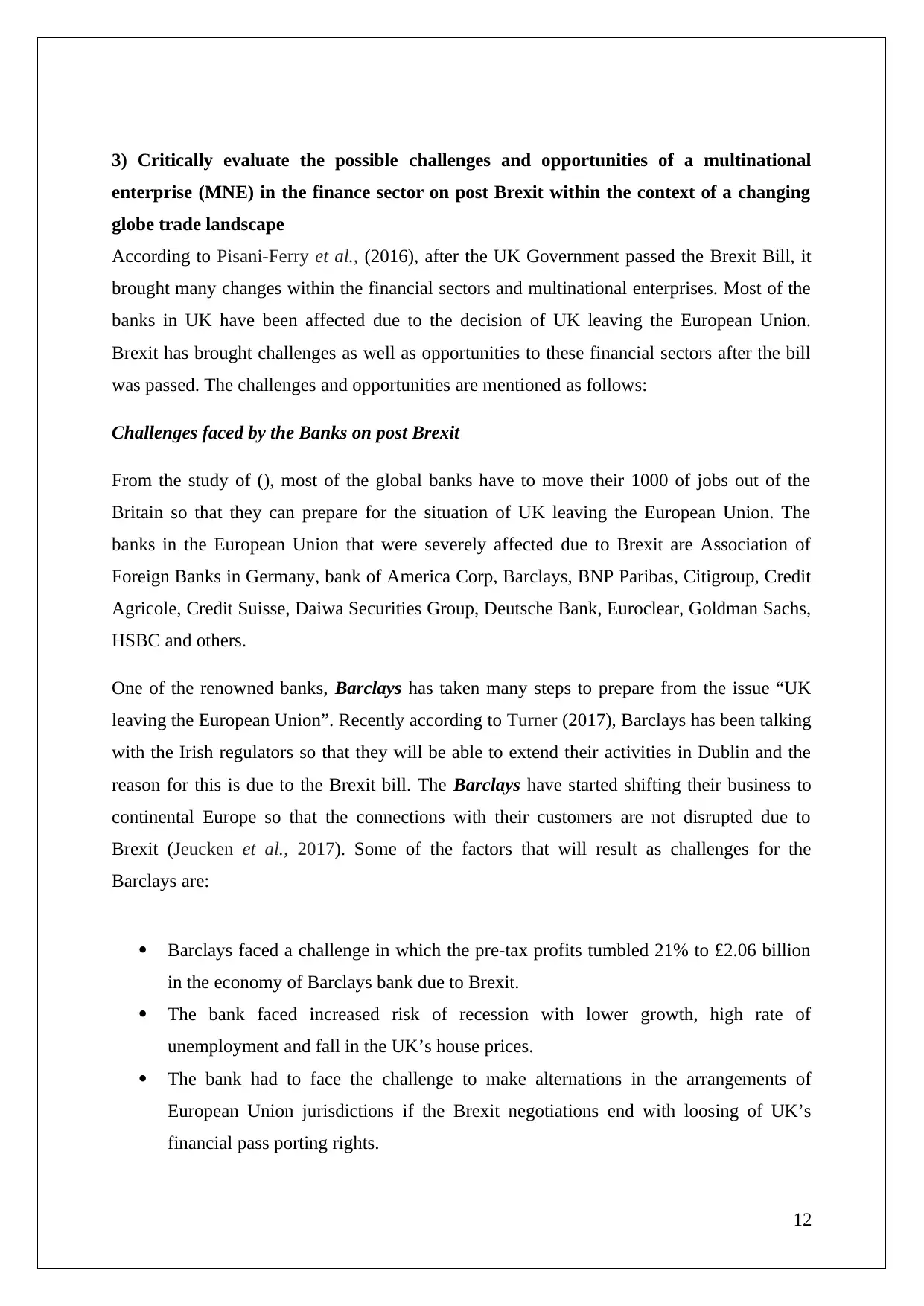
3) Critically evaluate the possible challenges and opportunities of a multinational
enterprise (MNE) in the finance sector on post Brexit within the context of a changing
globe trade landscape
According to Pisani-Ferry et al., (2016), after the UK Government passed the Brexit Bill, it
brought many changes within the financial sectors and multinational enterprises. Most of the
banks in UK have been affected due to the decision of UK leaving the European Union.
Brexit has brought challenges as well as opportunities to these financial sectors after the bill
was passed. The challenges and opportunities are mentioned as follows:
Challenges faced by the Banks on post Brexit
From the study of (), most of the global banks have to move their 1000 of jobs out of the
Britain so that they can prepare for the situation of UK leaving the European Union. The
banks in the European Union that were severely affected due to Brexit are Association of
Foreign Banks in Germany, bank of America Corp, Barclays, BNP Paribas, Citigroup, Credit
Agricole, Credit Suisse, Daiwa Securities Group, Deutsche Bank, Euroclear, Goldman Sachs,
HSBC and others.
One of the renowned banks, Barclays has taken many steps to prepare from the issue “UK
leaving the European Union”. Recently according to Turner (2017), Barclays has been talking
with the Irish regulators so that they will be able to extend their activities in Dublin and the
reason for this is due to the Brexit bill. The Barclays have started shifting their business to
continental Europe so that the connections with their customers are not disrupted due to
Brexit (Jeucken et al., 2017). Some of the factors that will result as challenges for the
Barclays are:
Barclays faced a challenge in which the pre-tax profits tumbled 21% to £2.06 billion
in the economy of Barclays bank due to Brexit.
The bank faced increased risk of recession with lower growth, high rate of
unemployment and fall in the UK’s house prices.
The bank had to face the challenge to make alternations in the arrangements of
European Union jurisdictions if the Brexit negotiations end with loosing of UK’s
financial pass porting rights.
12
enterprise (MNE) in the finance sector on post Brexit within the context of a changing
globe trade landscape
According to Pisani-Ferry et al., (2016), after the UK Government passed the Brexit Bill, it
brought many changes within the financial sectors and multinational enterprises. Most of the
banks in UK have been affected due to the decision of UK leaving the European Union.
Brexit has brought challenges as well as opportunities to these financial sectors after the bill
was passed. The challenges and opportunities are mentioned as follows:
Challenges faced by the Banks on post Brexit
From the study of (), most of the global banks have to move their 1000 of jobs out of the
Britain so that they can prepare for the situation of UK leaving the European Union. The
banks in the European Union that were severely affected due to Brexit are Association of
Foreign Banks in Germany, bank of America Corp, Barclays, BNP Paribas, Citigroup, Credit
Agricole, Credit Suisse, Daiwa Securities Group, Deutsche Bank, Euroclear, Goldman Sachs,
HSBC and others.
One of the renowned banks, Barclays has taken many steps to prepare from the issue “UK
leaving the European Union”. Recently according to Turner (2017), Barclays has been talking
with the Irish regulators so that they will be able to extend their activities in Dublin and the
reason for this is due to the Brexit bill. The Barclays have started shifting their business to
continental Europe so that the connections with their customers are not disrupted due to
Brexit (Jeucken et al., 2017). Some of the factors that will result as challenges for the
Barclays are:
Barclays faced a challenge in which the pre-tax profits tumbled 21% to £2.06 billion
in the economy of Barclays bank due to Brexit.
The bank faced increased risk of recession with lower growth, high rate of
unemployment and fall in the UK’s house prices.
The bank had to face the challenge to make alternations in the arrangements of
European Union jurisdictions if the Brexit negotiations end with loosing of UK’s
financial pass porting rights.
12
⊘ This is a preview!⊘
Do you want full access?
Subscribe today to unlock all pages.

Trusted by 1+ million students worldwide
1 out of 18
Related Documents
Your All-in-One AI-Powered Toolkit for Academic Success.
+13062052269
info@desklib.com
Available 24*7 on WhatsApp / Email
![[object Object]](/_next/static/media/star-bottom.7253800d.svg)
Unlock your academic potential
Copyright © 2020–2025 A2Z Services. All Rights Reserved. Developed and managed by ZUCOL.





